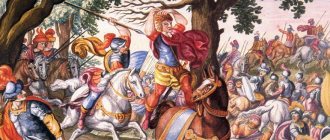Interpretation of the Psalms. Psalm 1
Introduction
The Book of Psalms is used more often than other books of Holy Scripture during Divine services and in personal, private prayer. The most common are the two main texts of the Psalter: Church Slavonic and Russian, included in the Synodal edition of the Bible.
The Church Slavonic text of the psalms is a translation from the Greek text of the Old Testament, which arose in the 3rd century. BC e. This Greek text is called the Septuagint, or the translation of the seventy interpreters (LXX). It was this Greek translation that formed the basis of the patristic tradition of interpretation of Holy Scripture in the first centuries of Christianity in the East and West.
The Russian, Synodal translation of the Psalter, which is part of the Holy Scriptures of the Old Testament, was made in contrast to the Church Slavonic Psalter according to the Hebrew text of the Bible, therefore, when comparing it with the liturgical Psalter, there are certain inconsistencies, and it is not able to fully clarify many difficult passages.
Understanding its meaning, and simply the literal content of the psalms, presents certain difficulties that can be overcome. The Psalter has always been a source of prayerful inspiration for all generations of Christians and thus has a long history of its reading and interpretation.
Two approaches to explaining the psalms can be outlined: an approach based on the tradition of the existence and perception of the psalms in the history of the Church, and an approach based on biblical criticism, based on the original text and the historical context of the emergence of the Psalter.
Both the Greek text of seventy interpreters and the Church Slavonic text, dating back to the works of Saints Cyril and Methodius, became an independent phenomenon of spiritual culture, and most importantly, the biblical prayer text of the Slavic peoples. And we must understand it, and not only understand, but see and feel the spiritual richness and fullness of this prayerful prophetic sighing, which inspired and rejoiced our ancestors.
The goal of biblical criticism is to reconstruct the original text and identify its true meaning, that is, the one that the author intended in his historical context. Therefore, for biblical studies, the Hebrew text from which the Psalter was translated into ancient Greek as part of the Septuagint is more important. However, the key to the church’s understanding of the Psalter lies in the tradition of its existence and reading. In the Roman Empire, Byzantium and Rus', the Psalter existed in the form of a Greek translation by seventy interpreters and a translation from it into Church Slavonic. Thus, the original Hebrew text appears rather on the periphery of the Orthodox tradition. P. A. Yungerov (1856–1921), a famous pre-revolutionary researcher and translator of the Old Testament, had a high opinion of the Slavic text of the Psalter and believed that it “is a copy of the Greek church Psalter, as it was and is now used in worship, interpreted in the ancient paternal period and in recent times."
Giving priority to the Greek text, the Greek and Slavic traditions, one should not at all diminish the importance of the Hebrew text and the achievements of modern biblical studies. The scientific approach to the Holy Scriptures and elements of biblical criticism are well known to the ancient Church (eg Origen, Lucian, St. Jerome of Stridon). Therefore, along with other sources of interpretation of the psalms, for their understanding it is necessary to turn to the tradition of studying the Hebrew text and its translation. Psalms are a poetic text, filled with images and various figures, which are characterized by parallelism, rhythm, repetition and other features characteristic of the Jewish biblical tradition.
Being simultaneously a biblical and liturgical book, the Word of God and a prayer book, the Psalter, both as an object of interpretation and from the point of view of the form of the text, is an integral and separate work that existed independently. The historical path of the Greek Psalter in the LXX translation is unusually complex due to the many reconciliations, editions, reviews, etc., and in fact it is difficult to say for sure from which exact text the Church Slavonic translation was made at one time, which in turn was also subject to changes. Thus, the scientific, critical edition of the Septuagint will not reflect all forms of expression of the rich and living text of the Psalter, in the perception of which not only various methods of biblical exegesis can be applied, but the prayer experience of the Church must also be taken into account.
The text of the Psalter used during worship, that is, the Church Slavonic text for a Christian in Slavic countries, is the text of a living church tradition. Therefore, it is this, more than the original Hebrew text, that can be considered as the first object of explanation. The richness and completeness of meaning and form, no less than in the study of the Hebrew original, is revealed when perceiving the text of living church tradition, because, just as the prophet once composed the psalms, responding to the Word of God speaking to him, so in the Church, responding to the Divine Logos, that same Revelation. It is the existence of the text in the Tradition of the Church that gives us the true richness of the content and meaning of the psalms.
This explanation is a consideration of the Psalter in the context of various forms of Sacred Tradition, so that the texts so often heard and read become an expected and joyful event in church and personal prayer. The purpose of this commentary will be an attempt to awaken love and interest in the Book of Psalms, to draw attention to the richness of its content.
The explanation will not be a line-by-line commentary on each verse, but will concern both the general nature of each psalm, its meaning and meaning, the biblical-historical context, and its individual verses, either causing special difficulties in understanding, or having special significance.
To understand the psalms, it is necessary, firstly, to consider the lexical meaning of words with the help of dictionaries, various translations, etc., and secondly, to understand the meaning of the content with the help of interpretations. Now, when comprehending the psalms, we turn to the tradition of understanding them at different times and, collecting different approaches to their explanation, we have a wide palette of meanings for ourselves. The Psalter, perceived through the experience of reading it by ancient church authors and Christian thinkers, becomes an amazing expression of deep intuitions and the most important truths of faith.
Sources for explaining the psalms can be their translations, ancient classical interpretations, patristic works, liturgical use and, in general, any Christian context for their citation and reference.
Of course, an important aid in explaining the text is its translation. Currently, there are two main translations of the Psalter into Russian. Synodal translation of the 19th century. from the Hebrew text and translation by P. A. Yungerov from the Greek text of the Septuagint. Naturally, the second translation is more consistent with the Church Slavonic Psalter and was undertaken at one time precisely for its better understanding. In addition, P. A. Yungerov’s translation also became a study of the Psalter: his brief notes on individual verses of the psalms are especially valuable, opening up prospects for further research to explain difficult passages. We can also mention the translation from Church Slavonic made by E. N. Birukova and I. N. Birukov1.
There are many known texts devoted to the explanation of the Psalter, which arose in the golden age of patristic writing in the 4th-5th centuries. Here are the most famous and significant of them.
- Interpretation of the Psalms attributed to St. Athanasius of Alexandria. Due to insertions by later authors, modern scholars deny this work authenticity. However, in this explanation, one can undoubtedly hear the voice and read the opinion of the ancient Church in the interpretation of the Psalter. Moreover, this is the Alexandrian tradition with its allegorical approach and Christocentric understanding of the psalms. This is a patristic text that was preserved by the ancient Church and brought to us by the Orthodox tradition, inscribing it with the name of one, perhaps the most significant of the authors who composed it.
- The most significant and famous interpretation of the Psalter in the Orthodox East was the interpretation of Blessed Theodoret of Cyrus, which combined Antiochene scholarship and the established tradition of church understanding of the psalms. According to P. A. Yungerov, his “explanation is brief, moral and typological.” Blzh. Theodoret pays attention to language, images, historical facts, and translations available in his time.
- Conversations on the Psalms of St. Basil the Great does not cover the entire Psalter: conversations on Ps. 1, 7, 14, 28, 29, 32, 33, 44, 45 and 48.
- Due to the lack of a Russian translation, the typological explanation of the psalms of St. is also less known. Cyril of Alexandria, which is also incompletely preserved.
- Conversations on the Psalms of St. John Chrysostom reflect the “scientific” approach to the interpretation of Scripture characteristic of the Antiochians. Although the works of this saint are primarily of a moral nature, the basis for preaching in them is a scientific approach, an understanding of the literal meaning and elements of biblical criticism in the form of the use and comparison of existing translations of the Bible into Greek. The conversations on 58 psalms (4–12, 43–49, 108–117, 119–150) are considered authentic.
Also, such valuable authentic works of the holy fathers as the “Epistle to Marcellinus on the Interpretation of the Psalms” by St. are devoted to the interpretation of the psalms. Athanasius of Alexandria and “On the Inscription of Psalms” by St. Gregory of Nyssa.
Many texts by other church writers have been preserved, famous in their time, but later subjected to criticism due to non-Orthodox views. Such authors include Origen, Didymus the Blind, Apollinaris of Laodicea, Diodorus of Tarsus, Theodore of Mopsuestia, Evagrius of Pontus, Asterius the Sophist. However, their works undoubtedly had an influence on Orthodox exegesis, so their legacy has its value both in method and in content. For the most part, these are texts that have not been translated into Russian, but are available, however, in the Greek original.
Western authors have interpretations of all 150 psalms of the blessed one. Augustine. From other authors, what has come down to us for the most part is either conversations on some psalms, or fragments and explanations of individual psalms. It is important to mention Hilary of Pictavia, St. Ambrose of Milan, blessed. Hieronymus of Stridon, Cassiodorus.
The interpretation of Euthymius Zigaben, well known in the Orthodox tradition, dates back to the later Byzantine period and represents a reworking of previous patristic explanations, supplemented by its own interpretation.
How the ancient church authors read and understood the psalter remains a mystery to us in many ways. Often the explanations have the character of a sermon and have a moralizing sound. Also, sometimes authors develop their own thoughts, dear or relevant for their time, simply starting from the sacred text, for example, considering the psalms as steps of spiritual ascent (St. Gregory of Nyssa). Like the entire Old Testament as a whole, so, in particular, the Book of Psalms, already on the pages of the New Testament, is presented as a primarily messianic book, prophesying about Christ the Savior.
Psalm 1
| In Church Slavonic | In Russian (translation by P. Yungerov) | In Russian (Synodal translation) |
| 1 Blessed is the man who does not walk in the counsel of the wicked, and does not stand in the ways of sinners, and does not sit in the seats of the destroyers, 2 but his will is in the law of the Lord, and in His law he learns day and night. 3 And it will be like a tree planted by the rising waters, which will yield its fruit in its season, and its leaf will not fall away, and everything that it does will prosper. 4 Not like wickedness, not like this, but like dust, which the wind sweeps away from the face of the earth. 5 For this reason the wicked will not rise again for judgment, nor the sinner for the council of the righteous. 6 For the Lord knows the way of the righteous, and the way of the wicked will perish. | Blessed is the man who did not go to the meeting of the wicked, and did not stand in the way of sinners, and did not sit in the company of destroyers, but in the law of the Lord is his will and he will study His law day and night. And he will be like a tree planted by springs of water, which will yield its fruit in its season, and its leaf will not fall away. And whatever he does will be successful. Not so wicked, not so: but like dust that the wind sweeps from the face of the earth! Therefore the wicked will not rise up into judgment, nor sinners into the congregation of the righteous. For the Lord knows the way of the righteous, but the way of the wicked will perish. | Blessed is the man who does not walk in the counsel of the wicked and does not stand in the way of sinners and does not sit in the congregation of the wicked, but his will is in the law of the Lord, and he meditates on His law day and night! And he will be like a tree planted by streams of water, which brings forth its fruit in its season, and whose leaf does not wither; and in everything he does, he will succeed. Not so - the wicked; but they are like dust blown by the wind. Therefore the wicked will not stand in judgment, nor sinners in the assembly of the righteous. For the Lord knows the way of the righteous, but the way of the wicked will perish. |
At every vespers on the eve of the holidays (except for the Lord's Twelve) and at the Sunday all-night vigil, we hear the beginning of the Psalter, for the assimilation and fulfillment of which, according to the story from the Fatherland, one monk did not have a whole life. Spiritual life is depicted as a procession along one of two paths. This theme of choice and description of the path of good and evil is characteristic of the Bible and early Christian literature. The basis of biblical morality and spirituality is the choice of path, therefore, at the beginning of the Psalter, which speaks about the many different phenomena of spiritual life, a person is faced with a choice between the “law of the Lord” and the “council of the wicked.”
The first psalm is noticeably different from the rest; according to the unanimous testimony of ancient interpreters, it is an introduction to the entire Psalter as a whole. According to S. Averintsev, “it is preceded by all subsequent psalms, just as a spoken prayer is preceded by reflection in silence”2.
St. Gregory of Nyssa says: “The psalm, presented to everyone, had no need for an inscription, because the purpose of what is said in it is clear to those reading; namely, it serves as an introduction to philosophy, advising us to move away from evil, to remain in goodness and, if possible, to become like God.”
St. Athanasius the Great, in his letter to Marcellinus, calls this psalm proclaiming beatitude, indicating how, for what and who can be called blessed, and in the interpretation of the psalms it is said that this is how David begins the prophecy about Christ, and calls those who trust in Him blessed. Since Christ in some places of Scripture is compared to a tree, then, according to the interpreter, the Psalmist implies that those who believe in Christ will be His body. St. Athanasius at this point formulates his most important principle of interpretation: in the Scriptures “Christ is everywhere to be found preached.” Following the Alexandrian tradition of biblical interpretation, St. Athanasius gives a characteristic Christ-centric passage and a vivid example of the symbolic interpretation of the words of the Psalm: And it will be like a tree planted by the rising waters, which will yield its fruit in its season, and its leaf will not fall away: “Christ is the tree of life; Apostles are branches; blood and water from the side of Christ - fruit, and blood in the image of suffering, and water in the image of baptism; words are leaves." Thus, the general moral character of the psalm acquires a deeper symbolic meaning.
The perception of the first psalm in the conversation of St. Basil the Great. It is characterized by deepening into the world of human thoughts, the innermost movements of the human heart. He understands the first psalm ascetically, turning to the inner world of the soul. Thus, to take the advice of the wicked means to doubt God’s Providence, the fulfillment of God’s promises and spiritual life in general. To stand in the path of sinners means not to feel the constant fluidity and change in life, which “has neither constant pleasures nor long-lasting sorrows.” Stopping a person on the path of life when the mind submits to carnal passions deprives one of bliss. Sitting “on the seats of the destroyers” means stagnation in sin, a prolonged stay in evil, a habit of sin, which “produces in souls some incorrigible habit” and passes into nature, and “he is blessed who is not carried away to destruction by the lures of pleasure, but with patience awaits the hope of salvation." Explaining the name of the destroyers of St. Vasily emphasizes the property of sin to easily and quickly multiply and spread to others: “Thus, the spirit of fornication is not limited to dishonoring one, but comrades immediately join in: feasts, drunkenness, shameful stories and an indecent woman who drinks together, smiles at one, smiles at another seduces and inflames everyone to the same sin.”
Finally, Blessed Theodoret gives a more practical and scientific interpretation. For him, this psalm has not only moral significance, but also a dogmatic dimension. He distinguishes between the concepts of wicked and sinners. The first are those who have a wrong idea of God, the second are those who lead lawless lives. The categories named in the first verse - path, standing and sitting - found their refraction in the presentation of the foundations of ascetic work: “the thought, whether it be bad or good, first comes into motion, and then is established, and after this it assumes a certain unshakable constancy.” The image of a tree near sources of water is also correlated with present life, in which, thanks to hope, one can be comforted by the expectation of future fruits: “although the fruits of labor are collected in a future life, yet here, as if some leaves, constantly carrying good hope within themselves, turn green and rejoice , and in the delight of the spirit bear the burden of labor.”
Now it is necessary to clarify several difficult passages in the first psalm.
Verse 1: Blessed is the man. The very concept of bliss goes back to God. In the proper sense, God is blessed, possessing all perfections. According to St. Gregory of Nyssa, “this is the definition of human bliss: it is likeness to the Divine.” Interpreters note that, of course, we are talking not only about men, but about man in general, as is typical of biblical language: the part means the whole. The psalmist “with the unity of nature considered it sufficient to designate the whole to point out what is predominant in the genus” (St. Basil the Great).
The first verse of the bl. Augustine has a direct Christological interpretation: “This should be understood about our Lord Jesus Christ, the Man of the Lord... You should also pay attention to the order of words: go, hundred, sit. Man left when he withdrew from God; became, enjoying sin; sat down when pride crushed him. He would not have been able to return back if he had not been freed by the One who did not follow the advice of the wicked, did not stand in the way of sinners and did not sit on the seat of destruction.”3
Verse 5: For this reason the wicked will not be resurrected for judgment, below the sinner in the council of the righteous causes difficulties in understanding both in the lexical meaning and in theological comprehension. The expression of the psalm: the wicked will not rise for judgment is used not in the sense of denying the resurrection of sinners, but as an indication that the uprising of the wicked will not be for the trial of their cases, but for the pronouncement of a sentence on them, since they are already condemned: they “immediately after the resurrection they will be punished, and will not be brought to trial, but will hear a sentence of execution” (Blessed Theodoret of Cyrus). A council can be understood as a meeting. Sinners in this case will be removed from the host of the righteous.
If judgment and council are considered as synonymous concepts (as well as the wicked and sinners),4 then this passage can be understood to mean that sinners will not be justified in any way before the righteous (they will not stand before their judgment or in their presence) or so that the wicked have no nothing to do with the righteous. In any case, they will not participate in court.
For the Lord tells us the way of the righteous... The concept of knowledge in the Bible is rich and varied, but it always presupposes not only information about the subject of knowledge, but also deep personal relationships. So, in the interpretation of St. Athanasius understands this knowledge as preference and endowment of mercy and grace.
From Western interpreters we will give an understanding of the last verse of the blj. Augustine: “And the way of the wicked shall perish” means the same thing as the words: The Lord knows not the way of the wicked. But this is said more simply - in the sense that to be unknown to the Lord means death, and to be known to Him means life. For the knowledge of God is existence, and His ignorance is non-existence.”
Priest Dimitry Rumyantsev, Master of Theology
- Psalter for teaching. M.: Rule of Faith, 2011.
- Averintsev S.S. Listening to the word: three actions in the initial verse of the first psalm - three stages of evil. // Selected Psalms. / Per. and comment. S. S. Averintseva. M.: St. Philaret Orthodox Christian Institute, 2005. pp. 126–136.
- Augustine Blessed Interpretation of the first psalm. / Per. from lat. diak. Augustin Sokolowski. https://www.bogoslov.ru/text/375834.html.
- “Usually the Psalmist thus repeats in a simpler form what was said before: that is, by the word “sinners” they mean the wicked, and what is said about “judgment” is here called “the council of the righteous”” (Blessed Augustine. Interpretation on first psalm).
Bibliography:
- Athanasius of Alexandria, St. Epistle to Marcellinus on the interpretation of the psalms. // Athanasius of Alexandria, St. Creations: In 4 vols. T. IV. Moscow, 1994. pp. 3–35.
- Athanasius of Alexandria, St. A warning about the psalms. // Athanasius of Alexandria, St. Creations: In 4 vols. T. IV. M., 1994. - pp. 36–39.
- Athanasius of Alexandria, St. Interpretation of the Psalms. // Athanasius of Alexandria, St. Creations: In 4 vols. T. IV. Moscow, 1994. pp. 40–422.
- Basil the Great, St. Conversations on the Psalms. // Basil the Great, St. Creations: In 2 vols. T. 1. M.: Sibirskaya blagozvonnitsa, 2008. P. 461–610.
- Gregory of Nyssa, St. On the inscription of psalms. M.: Publishing house named after. St. Ignatius of Stavropol, 1998.
- Efimy Zigaben. Explanatory Psalter of Efimius Zigaben (Greek philosopher and monk). Explained according to patristic interpretations. Per. from Greek Rep. [B. m., b. G.].
- John Chrysostom, St. Conversations on the Psalms. M.: Spassky Brotherhood, 2013.
- Theodoret of Cyrus, bl. Psalter with explanation of the meaning of each verse. M., 1997.
- Books of the Old Testament translated by P. A. Yungerov: Educational books / Ed. A. G. Dunaeva. M.: Publishing house of the Moscow Patriarchate of the Russian Orthodox Church, 2012. (Bibliography).
- Complete Church Slavonic dictionary. /
- Comp. priest Grigory Dyachenko. M.: Father's House, 2001.
- Psalter: In Russian translation from the Greek text LXX / with an introduction and notes by P. Yungerov. — Rep. — Holy Trinity Lavra of St. Sergius, 1997.
- Razumovsky G., prot. Explanation of the Holy Book of Psalms. - M.: PSTGU, 2013.
- Psalms 1–50 / edited by Craig A. Blaising and Carmen S. Hardin. — (Ancient Christian commentary on Scripture. Old Testament VII). — 2008.








